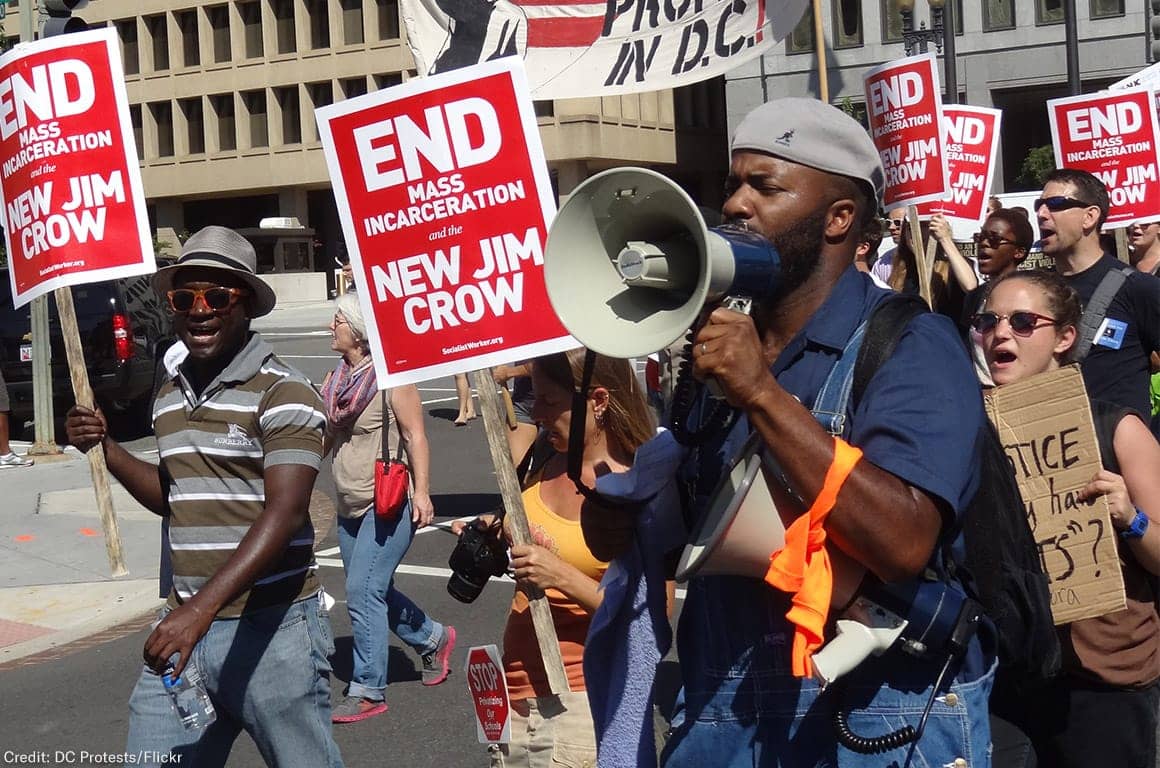
2022 legislative update from Legal Services for Prisoners with Children
Criminal Law
AB 124 (Kamlager) Defenses/sentences for victims of human trafficking, intimate partner violence, or sexual violence, trauma and youth offenders (Pen. 236.15, 236.23, 236.24, 1016.7, 1170).
- Creates an affirmative legal defense to crimes other than violent felonies if a person was coerced to commit the offense as a result of being a victim of human trafficking, intimate partner violence or sexual violence. (Expands pre-existing defense for trafficking victims).
- Requires prosecutor during plea negotiations to consider defendant’s experiences of trauma, victimization as described above, and/or youth (up to age 26).
- Requires the court to impose a mitigated term if a defendant’s experience of trauma, victimization as described above, and/or youth (up to age 26) was a contributing factor in commission of the offense, unless the aggravating circumstances outweigh the mitigating circumstances.
See also Release, Resentencing, and Record Clearing section above.
AB 331 (Jones-Sawyer) Organized theft (Pen. 490.4, 13899 et seq.). Extends organized retail theft law to Jan. 1, 2026, which makes it a crime to:
- Act in concert with another person(s) to steal merchandise (from physical premises or online) with intent to sell or return for value.
- Act in concert with two or more people to knowingly receive stolen property.
- Act as agent for another to steal merchandise as part of an organized plan.
- Recruit, coordinate, organize, supervise, direct, manage or finance others to commit theft.
Also reenacts regional property crimes task force convened by DOJ and CHP.
AB 333 (Kamlager) Gang crimes and enhancements (Pen. 186.22, 1109)
Redefines “pattern of criminal gang activity” for purposes of establishing the crime of active participation in a criminal street gang and imposing a gang sentencing enhancement.
- Requires crimes to commonly benefit the gang in a way that is more than reputational.
- Excludes crimes of looting, felony vandalism and certain personal identity fraud offenses.
- Excludes currently charged crime.
- Excludes crimes committed more than three years before currently charged crime.
Requires separate (bifurcated) trials upon request of defense as follows:
- Trial for underlying offense; if found guilty, later trial for gang enhancement allegation.
- Trial for non-gang offense separate from trial on a charge of gang participation.
Revises definition of “criminal street gang” from “any ongoing organization, association or group … whose members individually or collectively engage in, or have engaged in, a pattern of criminal gang activity” (among other criteria) to “an ongoing, organized association or group … whose members collectively engage in, or have engaged in, a pattern of criminal gang activity.”
AB 518 (Wicks) Eliminates requirement to impose most severe punishment (Pen. 654). When an act can be punished in multiple ways under the law, removes the requirement that the most severe punishment be imposed.
AB 625 (Arambula) Study of public defender workloads (Gov. 15403). Authorizes study of appropriate public defender workloads with report to Legislature by Jan. 1, 2024.
AB 700 (Cunningham) Allows trial/hearing when defendant in custody refuses to appear (Pen. 977, 1043, 1043.5). Allows felony and misdemeanor proceedings to proceed in absence of defendant in custody who refuses to appear where court makes certain findings by clear and convincing evidence.
AB 1347 (Jones-Sawyer) Prohibits bail renewal fees/multiple premiums (Pen. 1276.1). Prohibits bail agents from charging extra premium or a renewal fee while a case is pending. Allows $3,000 in statutory damages for violations.
AB 1452 (Ting) Pilot program to pay low-income jurors in SF (Civ. Proc. 240). Authorizes a pilot program in SF to pay low-income jurors $100 per day through 2023. Requires analysis to determine whether resulting juries better reflect economic/racial demographics of SF.
SB 71 (McGuire) Education as community service for infraction (Pen. 1209.5). Allows court to give community service credit for education programs in lieu of fines for infractions where paying the fine would be a hardship.
SB 73 (Wiener) Allow probation and suspended sentence for certain drug crimes (H&S 11370, Pen. 1203.07, 1203.073, 29820). Allows courts to grant probation or suspend sentencing for numerous drug offenses, including possession of opiates, cannabis, cultivating peyote and forging or altering prescriptions.
SB 81 (Skinner) Dismissal of enhancements (Pen. 1385).
- Requires (rather than allows) a court to dismiss an enhancement if it is in the furtherance of justice to do so.
- Court must give great weight to defense evidence of the following mitigating circumstances, which weigh heavily in favor of dismissal unless public safety would be endangered: (1) discriminatory racial impact; (2) multiple enhancements alleged;
(3) sentence would exceed 20 years (if so, shall be dismissed); (4) current offense related to mental illness, prior victimization or childhood trauma; (5) current offense not a violent felony or committed as a juvenile; (6) offense triggering enhancement was juvenile adjudication or is more than 5 years old; (7) firearm used was unloaded or inoperable.
SB 567 (Bradford) The Cunningham Fix (Pen. 1170,1170.1) Co-sponsored by LSPC.
- Requires a jury finding (or court finding if non-jury trial, or defense stipulation) of aggravating circumstances beyond a reasonable doubt before a defendant can be sentenced to an upper term. Prior conviction findings may be based on certified records.
- Requires separate (bifurcated) trial of current offense, followed by trial of aggravating circumstances after a guilty verdict, “except where evidence supporting an aggravating circumstance is admissible to prove or defend against the charged offense or enhancement at trial, or it is otherwise authorized by law.”
SB 317 (Stern) Incompetence to stand trial for misdemeanor (Pen. 1370.01, 4019)
After a person charged with a misdemeanor is found incompetent to stand trial, current law allows treatment to restore the person to competence, including use of psychotropic medication.
This bill replaces this procedure. Under new procedure, the court may:
- Grant diversion up to one year.
- Order modification of the person’s treatment plan
- Refer the person to assisted outpatient treatment and dismiss the charges.
- Refer the person for conservatorship proceedings if gravely disabled.
- Dismiss the charges.
- Dismiss a probation violation charge and return the person to supervision.
The person shall earn four days credit toward diversion for every two days served in actual custody.
Juvenile Dependency and Family Law
SB 354 (Skinner) Relative caregivers for children removed from parents (H&S 1522(g)(2), WIC 309, 319, 361.2, 361.4 and other statutes). Co-sponsored by LSPC. In juvenile dependency proceedings when a child is taken from parents:
- Allows a child welfare agency to grant a relative caregiver a criminal record exemption for an otherwise non-exemptible criminal conviction if the agency finds the child will be safe (as long as relative has no conviction in last five years for homicide, sex offense, spousal abuse or crime against a child).
- Requires a child welfare agency to help a relative or a non-relative extended family member obtain resources they need to qualify as an emergency placement home.
- Allows a juvenile court, if it finds the child will be safe, to place a child with a relative caregiver during a dependency case regardless of whether the child welfare agency has granted a criminal record exemption or Resource Family Approval.
- Expands the simplified criminal exemption process for all potential caregivers to cover all misdemeanors more than 3 years old (previously more than 5 years old) and felonies more than 5 years old (previously more than 7 years old).
- Excludes all infractions from criminal record exemption requirement (formerly, only minor traffic offenses).





